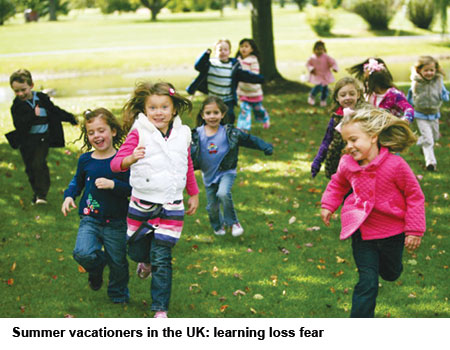 In the popular imagination, school summer holidays conjure up a picture of carefree youthful exploration. But many parents rely on the term-time services that schools give their offspring, such as supervision and meals. Come the holidays, they can suddenly find their schedules and budgets stretched. Researchers also say that the long break often sets back children’s learning, and that children from poorer backgrounds are worst affected.
In the popular imagination, school summer holidays conjure up a picture of carefree youthful exploration. But many parents rely on the term-time services that schools give their offspring, such as supervision and meals. Come the holidays, they can suddenly find their schedules and budgets stretched. Researchers also say that the long break often sets back children’s learning, and that children from poorer backgrounds are worst affected.
The vast majority of the world’s school calendars include summer holidays. Their length ranges from three weeks in South Korea to three months in America, Italy and Latvia. The holidays’ 19th-century origins are hazy. It is popularly believed that they are a hangover from the West’s agrarian past, when families needed their children’s help in the fields during the summer; but many historians think the evidence for this is thin.
Experts also talk of “summer learning loss”, in which children return to school having forgotten some of what was taught the year before. “It is pretty clear that kids forget things over the summer,” says Harris Cooper of Duke University, North Carolina. A study, using test-score data from students in the 7-15 years age group in an unnamed state in America’s South in 2008-12, found that on average, children lost more than a quarter of their school-year learning during summer vacations.
Evidence from other countries is scarce. The impact appears to vary by socio-economic class. Many poor children fall behind their wealthier peers over the holidays. “Summer is the most unequal time of the year,” says Matthew Boulay of the National Summer Learning Association, an American NGO. Well-off parents can fill the gap left by school, keeping their children stimulated with summer camps, trips abroad or private tuition. Poorer families, obviously, find this harder. Demand for subsidised ‘enrichment’ activities often outstrips supply. Boulay recalls meeting a mother in Oregon who queued for four hours to enrol for free swimming lessons for her son.
Natasha Cockram, who runs the summer programme at Cadoxton Primary School, worries that many children in Barry will spend most of the summer indoors, glued to their screens, because parents are unable to afford child care or activities and also loath to let them roam unsupervised. “I get very bored at home,” complains one six-year-old taking part in a summer programme. “There’s nothing to do except sit on the sofa and watch TV.” Older children, too, may have less to keep them busy. Data from the Pew Research Centre suggest that the number of 16 to 19-year-olds in America with paid summer jobs has fallen from over a half in 2000 to roughly a third last year — though this is partly because more are taking on unpaid internships.
Experts suggest three types of solutions to the problems posed by long summer holidays: extending the school year; spreading holidays to other times of the year; and more state-provided summer-holiday activities. South Korea is an extreme test-case for the first approach. It has the world’s longest school year and shortest summer break. For many students, even the short holidays offer little respite, since most are enrolled in private tuition, often in a hagwon (crammer). Three in ten parents surveyed in July said they planned to increase the number of hagwon classes their children will have to attend this summer.
A second approach is to shorten the summer break but spread the holidays more evenly through the year. Janet Hayward, head teacher at Cadoxton, wants the six-week British summer holiday reduced to four weeks, with half-term breaks lengthened. Prof. Cooper says America’s three-month break may be outdated, and that a shorter one would be “more compatible with modern American life”.
Chloe Hughes, a youth-worker in Barry, contrasts fond memories of her own childhood summers with the predicament many families face at holiday-time today. “I think a lot of people dread it,” she says.























